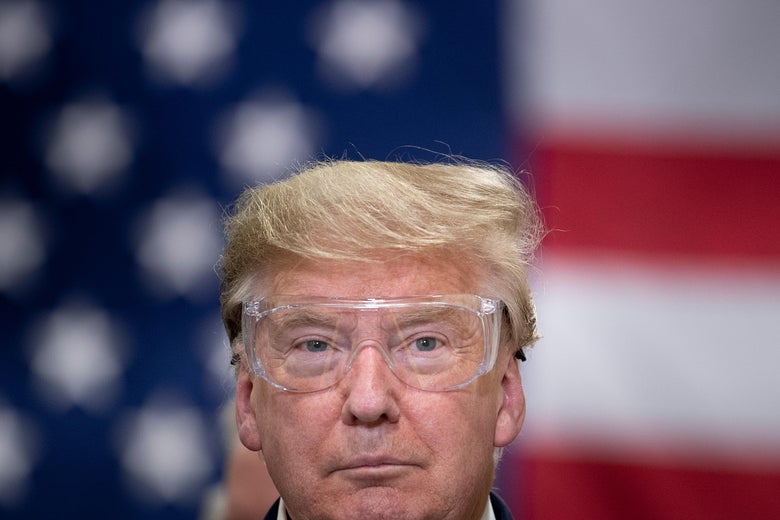
President Trump sends a letter threatening further funding cuts and possible withdrawal from the WHO.
BRENDAN SMIALOWSKI/Getty Images
After pausing American funding to the World Health Organization in April, President Donald Trump, on Monday, threatened to permanently draw down funding and even withdraw from the organization. The threat was issued in a letter tweeted out by the president late Monday night after China’s President Xi Jinping addressed health leaders at the WHO’s (virtual) World Health Assembly Monday. Trump refused an invitation to speak at the annual gathering. “It is clear the repeated missteps by you and your organization in responding to the pandemic have been extremely costly for the world,” Trump wrote following several pages of grievances about the WHO and the spread of the virus from Wuhan. “The only way forward for the World Health Organization is if it can actually demonstrate independence from China.” Trump went on to demand reform of the organization in the next 30 days, but stopped short of what that might look like.
What does Trump and his administration actually want from the WHO? Exactly what it’s getting at the moment: a global skirmish, a geopolitical dustup that the president can point to as a sign of strength but also hints at conspiracy, absolving Trump of accountability for his domestic handling of the pandemic. It’s hard to find tangible policy solutions and hammer out compromise when one side is so heavily invested in the fight itself, rather than the outcome. Trump wants a boogeyman, not a policy paper. So don’t expect much to change until November.
The underlying premise of Trump’s complaints about the WHO doesn’t leave much of a path forward for good-faith reform. Could the WHO have done better? Certainly. Is there room for improvement in the agency’s functioning? Absolutely. But the Trump administration’s biggest complaint about the WHO is fundamentally that the organization hasn’t catered to American demands and American interests. “I cannot allow American taxpayer dollars to continue to finance an organization that, in its present state, is so clearly not serving America’s interests,” Trump wrote in his letter to WHO director-general Tedros Adhanom Ghebreyesus. The presumption of the Trump letter, and the president’s actions in almost all cases, is that if the U.S. is paying for something, its interests must be served directly, immediately, rather than obliquely or collectively. If the U.S. contributed $553 million of the WHO’s $6 billion budget last year and China chipped in $43 million, by Trump’s math, then the country the WHO should be catering to is the U.S. This application of this logic does not make the WHO a better functioning organization or more equipped to deal with the current and future outbreaks; it makes it more malleable to American interests.
The logic emanating from the White House that China hasn’t sufficiently paid for its interests to matter, and that U.S. funds demand the prioritization of U.S. interests, has left the administration wide open to what is now happening: the U.S. is withdrawing funds—or threatening to—and China is increasing its funding. Now what? If China ultimately matches the U.S. contribution—which totals roughly 15 percent of the WHO’s budget—then is the country off the hook for its lack of transparency? During his address to the health assembly Monday, President Xi committed $2 billion in aid and future Chinese-made vaccines to the pandemic effort. Are the two countries square now?
Trump continues to suggest that the WHO is beholden to China, but the question is why would the global organization hypothetically be in Beijing’s pocket? One important answer to China’s influence in the operation of the WHO is the outsized role China plays in pandemics, past and future. Before COVID-19, there was avian flu and SARS, among others. That’s what makes China a vital participant in the governance of global health—it’s a launching pad for diseases that can spill over its borders. In this respect, China is not operating from a position of power, but one of vulnerability (in this case, to disease). The rest of the world’s vulnerability to those same diseases makes access and information vital, and therefore China’s participation and collaboration essential. The WHO’s willingness to play ball with China stems from its need to provide the global community with that very access and information essential to combatting disease. That process is a deeply political one. It’s one that the WHO handles sometimes awkwardly and at other times poorly, but it’s one that needs navigating in order to help prevent future outbreaks of the next novel pathogen. If not by the WHO, then who? Trump’s not that interested in that far more complicated question because he’s not looking for answers, he’s searching for scapegoats.
from Slate Magazine https://ift.tt/2zc3ues
via IFTTT
沒有留言:
張貼留言